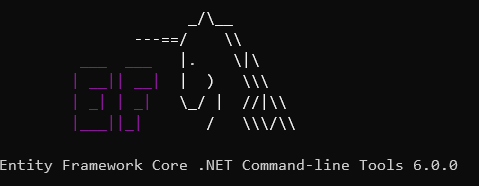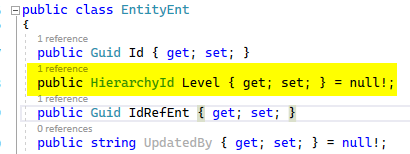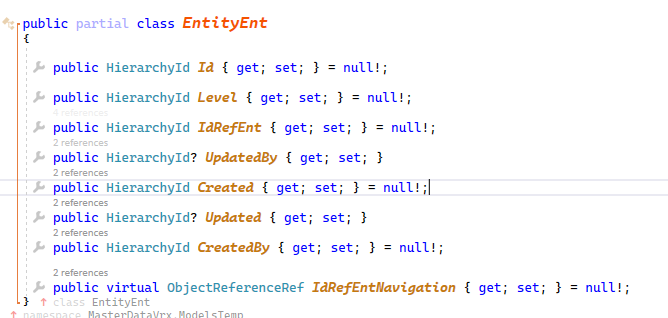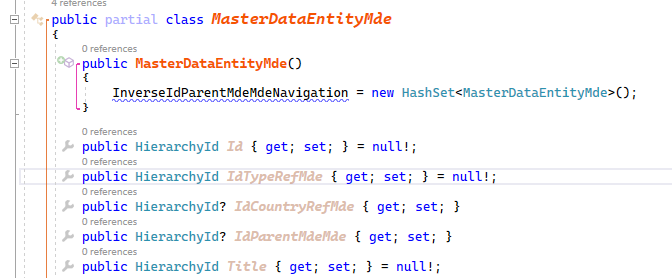System.MissingMethodException: 'Method not found: 'Void CoreTypeMappingParameters..ctor(System.Type, Microsoft.EntityFrameworkCore.Storage.ValueConversion.ValueConverter, Microsoft.EntityFrameworkCore.ChangeTracking.ValueComparer, Microsoft.EntityFrameworkCore.ChangeTracking.ValueComparer, System.Func`3<Microsoft.EntityFrameworkCore.Metadata.IProperty,Microsoft.EntityFrameworkCore.Metadata.IEntityType,Microsoft.EntityFrameworkCore.ValueGeneration.ValueGenerator>)'.'
at Microsoft.EntityFrameworkCore.SqlServer.Storage.SqlServerHierarchyIdTypeMapping.CreateRelationalTypeMappingParameters(String storeType, Type clrType)
at Microsoft.EntityFrameworkCore.SqlServer.Storage.SqlServerHierarchyIdTypeMappingSourcePlugin.FindMapping(RelationalTypeMappingInfo& mappingInfo)
at Microsoft.EntityFrameworkCore.Storage.RelationalTypeMappingSource.FindMapping(RelationalTypeMappingInfo& mappingInfo)
at Microsoft.EntityFrameworkCore.SqlServer.Storage.Internal.SqlServerTypeMappingSource.FindMapping(RelationalTypeMappingInfo& mappingInfo)
at Microsoft.EntityFrameworkCore.Storage.RelationalTypeMappingSource.<FindMappingWithConversion>b__8_0(ValueTuple`3 k)
at System.Collections.Concurrent.ConcurrentDictionary`2.GetOrAdd(TKey key, Func`2 valueFactory)
at Microsoft.EntityFrameworkCore.Storage.RelationalTypeMappingSource.FindMapping(Type type, IModel model)
at Microsoft.EntityFrameworkCore.Metadata.Internal.MemberClassifier.IsCandidateNavigationPropertyType(Type targetType, MemberInfo memberInfo, Model model, Nullable`1& shouldBeOwned)
at Microsoft.EntityFrameworkCore.Metadata.Internal.MemberClassifier.FindCandidateNavigationPropertyType(MemberInfo memberInfo, IConventionModel model, Nullable`1& shouldBeOwned)
at Microsoft.EntityFrameworkCore.Metadata.Internal.MemberClassifier.GetNavigationCandidates(IConventionEntityType entityType)
at Microsoft.EntityFrameworkCore.Metadata.Conventions.RelationshipDiscoveryConvention.FindRelationshipCandidates(IConventionEntityTypeBuilder entityTypeBuilder, HashSet`1 otherInverseCandidateTypes)
at Microsoft.EntityFrameworkCore.Metadata.Conventions.RelationshipDiscoveryConvention.DiscoverRelationships(IConventionEntityTypeBuilder entityTypeBuilder, IConventionContext context, HashSet`1 otherInverseCandidateTypes)
at Microsoft.EntityFrameworkCore.Metadata.Conventions.Internal.ConventionDispatcher.ImmediateConventionScope.OnEntityTypeAdded(IConventionEntityTypeBuilder entityTypeBuilder)
at Microsoft.EntityFrameworkCore.Metadata.Conventions.Internal.ConventionDispatcher.OnEntityTypeAddedNode.Run(ConventionDispatcher dispatcher)
at Microsoft.EntityFrameworkCore.Metadata.Conventions.Internal.ConventionDispatcher.DelayedConventionScope.Run(ConventionDispatcher dispatcher)
at Microsoft.EntityFrameworkCore.Metadata.Conventions.Internal.ConventionDispatcher.ConventionBatch.Run()
at Microsoft.EntityFrameworkCore.Metadata.Conventions.Internal.ConventionDispatcher.ConventionBatch.Dispose()
at Microsoft.EntityFrameworkCore.Metadata.Conventions.Internal.ConventionDispatcher.ImmediateConventionScope.OnModelInitialized(IConventionModelBuilder modelBuilder)
at Microsoft.EntityFrameworkCore.Metadata.Internal.Model..ctor(ConventionSet conventions, ModelDependencies modelDependencies, ModelConfiguration modelConfiguration)
at Microsoft.EntityFrameworkCore.ModelBuilder..ctor(ConventionSet conventions, ModelDependencies modelDependencies, ModelConfiguration modelConfiguration)
at Microsoft.EntityFrameworkCore.ModelConfigurationBuilder.CreateModelBuilder(ModelDependencies modelDependencies)
at Microsoft.EntityFrameworkCore.Infrastructure.ModelSource.CreateModel(DbContext context, IConventionSetBuilder conventionSetBuilder, ModelDependencies modelDependencies)
at Microsoft.EntityFrameworkCore.Infrastructure.ModelSource.GetModel(DbContext context, ModelCreationDependencies modelCreationDependencies, Boolean designTime)
at Microsoft.EntityFrameworkCore.Internal.DbContextServices.CreateModel(Boolean designTime)
at Microsoft.EntityFrameworkCore.Internal.DbContextServices.get_Model()
at Microsoft.Extensions.DependencyInjection.ServiceLookup.CallSiteRuntimeResolver.VisitCache(ServiceCallSite callSite, RuntimeResolverContext context, ServiceProviderEngineScope serviceProviderEngine, RuntimeResolverLock lockType)
at Microsoft.Extensions.DependencyInjection.ServiceLookup.CallSiteRuntimeResolver.VisitScopeCache(ServiceCallSite callSite, RuntimeResolverContext context)
at Microsoft.Extensions.DependencyInjection.ServiceLookup.CallSiteVisitor`2.VisitCallSite(ServiceCallSite callSite, TArgument argument)
at Microsoft.Extensions.DependencyInjection.ServiceLookup.CallSiteRuntimeResolver.VisitConstructor(ConstructorCallSite constructorCallSite, RuntimeResolverContext context)
at Microsoft.Extensions.DependencyInjection.ServiceLookup.CallSiteRuntimeResolver.VisitCache(ServiceCallSite callSite, RuntimeResolverContext context, ServiceProviderEngineScope serviceProviderEngine, RuntimeResolverLock lockType)
at Microsoft.Extensions.DependencyInjection.ServiceLookup.CallSiteRuntimeResolver.VisitScopeCache(ServiceCallSite callSite, RuntimeResolverContext context)
at Microsoft.Extensions.DependencyInjection.ServiceLookup.CallSiteVisitor`2.VisitCallSite(ServiceCallSite callSite, TArgument argument)
at Microsoft.Extensions.DependencyInjection.ServiceLookup.CallSiteRuntimeResolver.VisitConstructor(ConstructorCallSite constructorCallSite, RuntimeResolverContext context)
at Microsoft.Extensions.DependencyInjection.ServiceLookup.CallSiteRuntimeResolver.VisitCache(ServiceCallSite callSite, RuntimeResolverContext context, ServiceProviderEngineScope serviceProviderEngine, RuntimeResolverLock lockType)
at Microsoft.Extensions.DependencyInjection.ServiceLookup.CallSiteRuntimeResolver.VisitScopeCache(ServiceCallSite callSite, RuntimeResolverContext context)
at Microsoft.Extensions.DependencyInjection.ServiceLookup.CallSiteVisitor`2.VisitCallSite(ServiceCallSite callSite, TArgument argument)
at Microsoft.Extensions.DependencyInjection.ServiceLookup.CallSiteRuntimeResolver.VisitConstructor(ConstructorCallSite constructorCallSite, RuntimeResolverContext context)
at Microsoft.Extensions.DependencyInjection.ServiceLookup.CallSiteRuntimeResolver.VisitCache(ServiceCallSite callSite, RuntimeResolverContext context, ServiceProviderEngineScope serviceProviderEngine, RuntimeResolverLock lockType)
at Microsoft.Extensions.DependencyInjection.ServiceLookup.CallSiteRuntimeResolver.VisitScopeCache(ServiceCallSite callSite, RuntimeResolverContext context)
at Microsoft.Extensions.DependencyInjection.ServiceLookup.CallSiteVisitor`2.VisitCallSite(ServiceCallSite callSite, TArgument argument)
at Microsoft.Extensions.DependencyInjection.ServiceLookup.CallSiteRuntimeResolver.VisitConstructor(ConstructorCallSite constructorCallSite, RuntimeResolverContext context)
at Microsoft.Extensions.DependencyInjection.ServiceLookup.CallSiteRuntimeResolver.VisitCache(ServiceCallSite callSite, RuntimeResolverContext context, ServiceProviderEngineScope serviceProviderEngine, RuntimeResolverLock lockType)
at Microsoft.Extensions.DependencyInjection.ServiceLookup.CallSiteRuntimeResolver.VisitScopeCache(ServiceCallSite callSite, RuntimeResolverContext context)
at Microsoft.Extensions.DependencyInjection.ServiceLookup.CallSiteVisitor`2.VisitCallSite(ServiceCallSite callSite, TArgument argument)
at Microsoft.Extensions.DependencyInjection.ServiceLookup.CallSiteRuntimeResolver.VisitConstructor(ConstructorCallSite constructorCallSite, RuntimeResolverContext context)
at Microsoft.Extensions.DependencyInjection.ServiceLookup.CallSiteRuntimeResolver.VisitCache(ServiceCallSite callSite, RuntimeResolverContext context, ServiceProviderEngineScope serviceProviderEngine, RuntimeResolverLock lockType)
at Microsoft.Extensions.DependencyInjection.ServiceLookup.CallSiteRuntimeResolver.VisitScopeCache(ServiceCallSite callSite, RuntimeResolverContext context)
at Microsoft.Extensions.DependencyInjection.ServiceLookup.CallSiteVisitor`2.VisitCallSite(ServiceCallSite callSite, TArgument argument)
at Microsoft.Extensions.DependencyInjection.ServiceLookup.CallSiteRuntimeResolver.Resolve(ServiceCallSite callSite, ServiceProviderEngineScope scope)
at Microsoft.Extensions.DependencyInjection.ServiceLookup.DynamicServiceProviderEngine.<>c__DisplayClass2_0.<RealizeService>b__0(ServiceProviderEngineScope scope)
at Microsoft.Extensions.DependencyInjection.ServiceProvider.GetService(Type serviceType, ServiceProviderEngineScope serviceProviderEngineScope)
at Microsoft.Extensions.DependencyInjection.ServiceProviderServiceExtensions.GetRequiredService(IServiceProvider provider, Type serviceType)
at Microsoft.Extensions.DependencyInjection.ServiceProviderServiceExtensions.GetRequiredService[T](IServiceProvider provider)
at Microsoft.EntityFrameworkCore.DbContext.get_DbContextDependencies()
at Microsoft.EntityFrameworkCore.DbContext.get_ContextServices()
at Microsoft.EntityFrameworkCore.DbContext.get_DbContextDependencies()
at Microsoft.EntityFrameworkCore.DbContext.Set[TEntity]()










